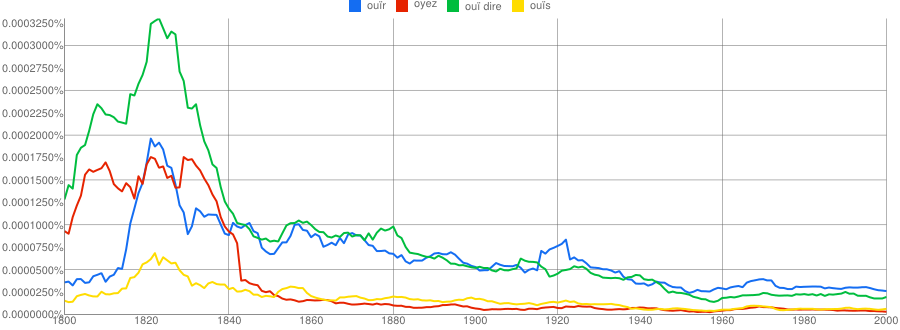Today, you are likely to find some French people who do not understand the verb ouïr. You should be safe (but you'll sound old-fashioned) in writing if you stick to the (not very) common tenses and set phrases (ouïr, j'ouïs (past simple, but you may see it used as a present tense), avoir ouï(-)dire, oyez). Orally, ouïr or ouï(s) sounds like the very common word oui (yes), so a person hearing it is likely to think of the affirmative word even in a verb position.
The verb has been on its way out for a long time. The first edition of the Dictionaire de l'Académie française (in 1694) already noted that the verb is defective, which is a sign that it is not very common. It would still have seemed normal usage at the time, however.
Il n'a guere d'usage qu'à l'Infinitif, au Preterit, & aux temps formez du participe.
The first edition of the Dictionaire used ouïr in the definition of entendre, without expressing a preference for one or the other.
Il veut dire encore, Oüir. J'estois si loin que je ne le pouvois entendre. il n'entend pas bien clair, entendre dur.
Note that at the time, understand was still given as the primary meaning of entendre. The 4th edition (1762) gave ouïr as the primary meaning of entendre, and this lasted until the 8th edition (1932) which changed the wording to percevoir par l'ouïe.
Littré (1872) argued that the verb was not that uncommon and should be used more. That's a sure sign that the disuse of the verb was already well-established.
Cette conjugaison, très régulière, est inusitée, excepté à l'infinitif présent et au participe passé, selon l'Académie ; mais il faut ajouter comme usités encore le parfait défini et l'imparfait du subjonctif ; les autres temps ne s'emploient que dans le style marotique ; pourtant il serait bien utile de remettre en usage oyant, et de dire en oyant, au lieu de en entendant, qui est si désagréable à l'oreille.
Google's book database shows a marked decrease of the use of the verb in the early 19th century, but beware that this may be due to a sampling bias (the database is skewed and has a high proportion of misdates in this period).


